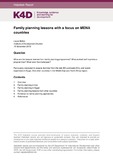Family Planning Lessons with a Focus on MENA Countries
Abstract
This report aimed to look at lessons on family planning programming focussing on Iran in the late 1980’s and early 1990’s and recent attempts in Egypt. Journal articles and grey literature were drawn on. A brief search on family planning lessons in Middle East and North African countries and developing countries more broadly was carried out and top level results highlighted. Between 1989 and 1997, contraceptive prevalence in Iran went from 49 to 76 percent. Following census results indicating a population growth problem in Iran the government expanded family planning policies and programmes in 1989. Key to success in Iran was religious leaders being part of the government so messages were approved of and spread through Muslim networks. Policy makers acted because they had an understanding of the consequences of overpopulation. More recently there is a focus to further improve provision to reduce unwanted pregnancy rates by improving counselling and choice of contraceptive methods. Within the scope of this review a small amount of recent literature on family planning in Egypt was found. Contraceptive prevalence has risen alongside a marked increase in family planning clinics, from 3,862 in 1981 to 6,005 in 2005. Family planning was government-led and donor supported during this time. Quality of care is noted as important alongside the increase in numbers of facilities. Staff incentives in facilities are recommended to reduce human resource problems. A survey in MENA countries suggests a need to improve health information systems to determine progress. There seems a gap between national strategy and quality implementation. Monitoring and evaluation would help to understand and improve this situation. Vast improvements in family planning statistics in Ethiopia are attributed to political will with the government understanding the value of family planning; substantial donor and NGO support; and a health extension programme delivering services to neglected areas of the country.
Citation
Bolton, L. (2019). Family planning lessons with a focus on MENA countries. K4D Helpdesk Report 688. Brighton, UK: Institute of Development Studies.Is part of series
K4D Helpdesk Report;688Collections
- K4D [937]

